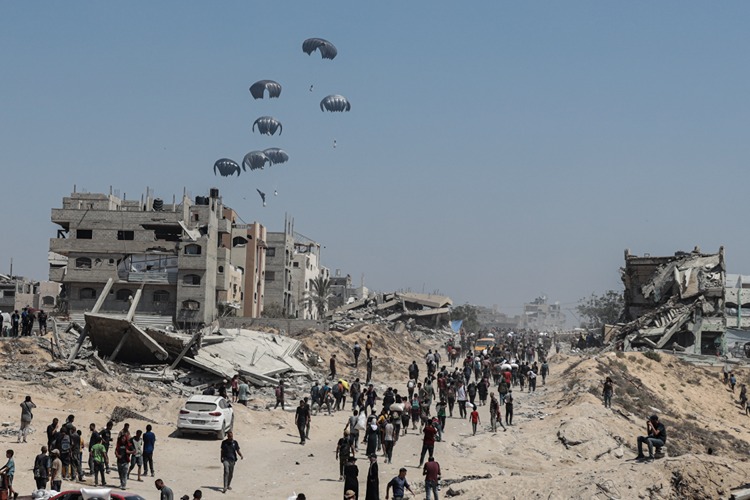
Gaza Health Ministry Israel s Declared Humanitarian Pause Means Nothing
Gaza Health Ministry: Israel’s Declared “Humanitarian Pause” Means Nothing
Munir al-Bursh, Director-General of the Health Ministry in Gaza, stated that Israel’s so-called “humanitarian pause” means nothing unless it turns into a real opportunity to save lives.
In a written statement, al-Bursh said that during the temporary "humanitarian pause," which has been marked by international silence and hesitation, the wounded continue to cry out for help, children are dying of hunger, and mothers are struggling to survive with the children who remain alive.
He called for the immediate evacuation of patients in critical condition—those with brain and spinal cord injuries who cannot be treated under current conditions and face a high risk of death without transfer.
“The humanitarian pause must become a real opportunity to save lives”
Al-Bursh emphasized the urgent need for medical supplies and food for children and infants in Gaza, including therapeutic milk and high-protein, high-calorie supplements. He reiterated that Israel’s declared “humanitarian pause” is meaningless unless it becomes a real chance to save lives.
He added that every delay means another funeral, and every moment of silence results in yet another child dying in their mother’s arms due to lack of medicine or milk.
Israel’s Ministry of Foreign Affairs had announced on July 27 that, in light of increasing international pressure and a worsening humanitarian catastrophe in Gaza—marked by mass starvation—it would implement a limited “humanitarian pause” in its attacks.
The Israeli military later confirmed that the pause would begin at 10:00 a.m. and end at 8:00 p.m. local time.
Gaza Government: Israel’s Aid Spectacle Won’t End Starvation — The Real Solution Is Lifting the Blockade
In a separate statement, the Gaza government said that despite talks of allowing aid passage, “even if implemented, the move will be limited and will not end the crime of starvation that Tel Aviv has imposed on Gaza.”
The statement highlighted that aid deliveries have been blocked for 148 days, and infant formula has not been allowed into the region. Gaza requires 600 aid trucks per day, and to save the lives of infants, 250,000 boxes of milk and formula monthly.
It emphasized that Gaza is facing a severe humanitarian catastrophe, and that the continued blockade, closure of border crossings, and obstruction of aid are worsening the crisis.
Although the Israeli army claimed this morning that it would halt localized military operations and allow aid into certain areas of Gaza, this does not change the reality: 2.4 million Palestinians are still facing starvation and genocide.
“The only real solution is the unconditional lifting of the blockade”
The Gaza Government stressed that the only comprehensive and lasting solution is the immediate and unconditional lifting of the blockade, full opening of border crossings, and ensuring continuous access to aid and fuel. Temporary measures, it said, will not resolve the crisis.
UNRWA: Airdrops Are a Distraction from the Catastrophe
Philippe Lazzarini, Commissioner-General of the UN Relief and Works Agency for Palestine Refugees (UNRWA), commented on aid efforts by air, describing them as “a distraction aimed at covering up the humanitarian catastrophe.”
Following the famine caused by Israel’s blockade, the United Arab Emirates and Jordan began airdropping aid into Gaza.
Gaza Is Dying of Hunger
Under Israel’s relentless attacks and tight siege, the Gaza Strip is experiencing a full-blown humanitarian disaster—marked by widespread hunger, a lack of clean water, shortages of medicine, and no hygiene supplies.
Deaths due to hunger—especially among children—are on the rise.
Both local and international groups have accused Israel of using hunger and thirst as weapons of war.
Having destroyed 88% of Gaza’s civilian infrastructure, the Israeli military frequently targets displaced Palestinians with bombardments, even in areas where it previously ordered them to relocate.
Of the 2.3 million residents in Gaza, around 2 million have been displaced, many multiple times.
These displaced civilians, lacking basic necessities, are trying to survive in makeshift tents or overcrowded, unsanitary schools where disease is rampant and toilets are scarce.
Meanwhile, the Israeli military continues to bomb civilian areas and tents sheltering displaced people with daily attacks.